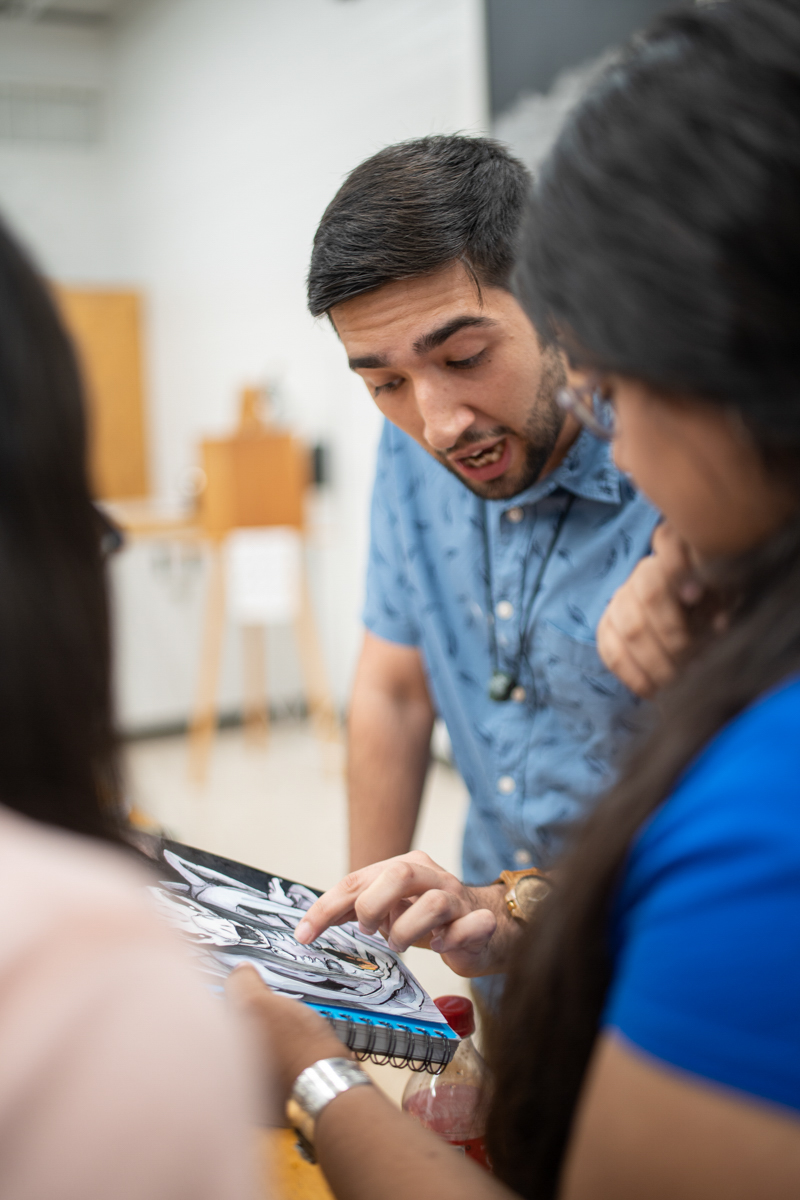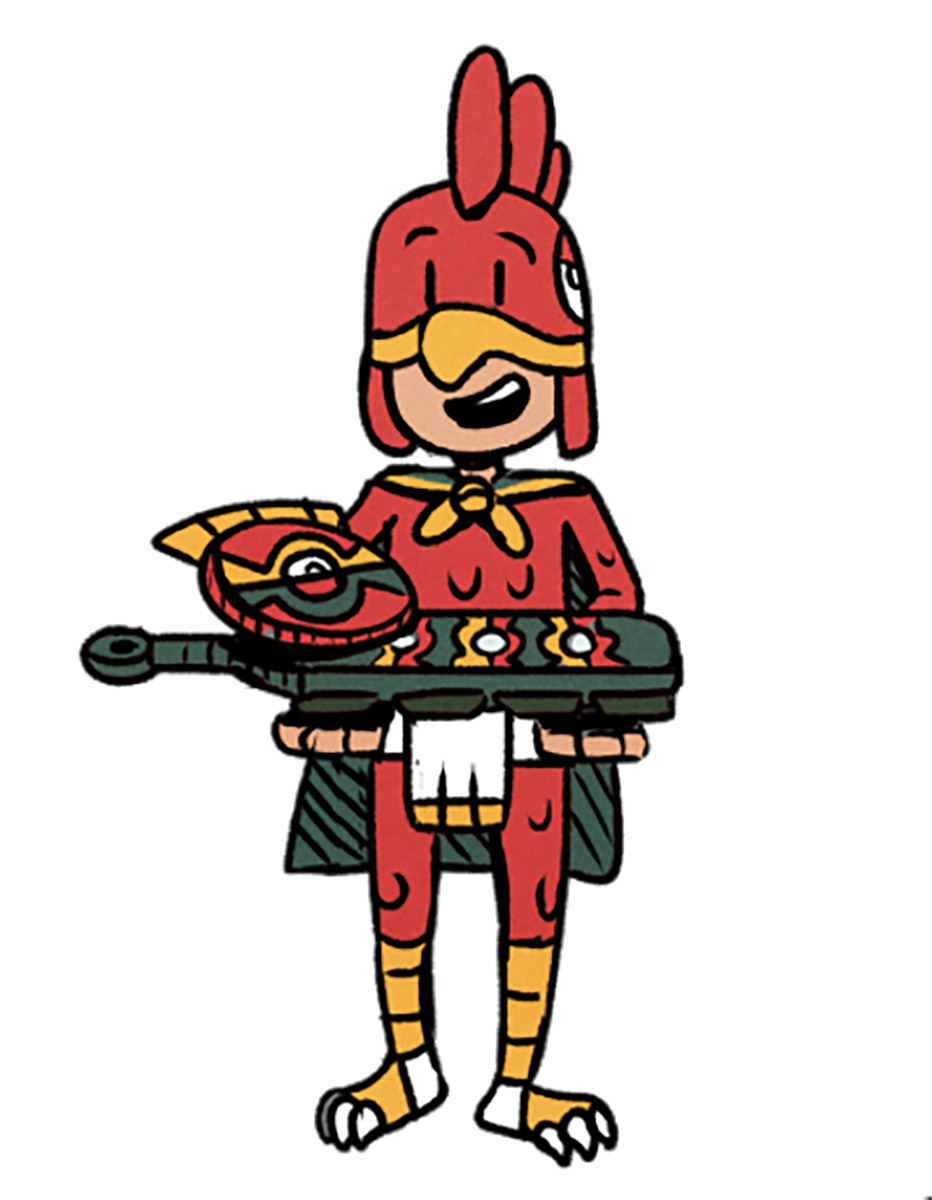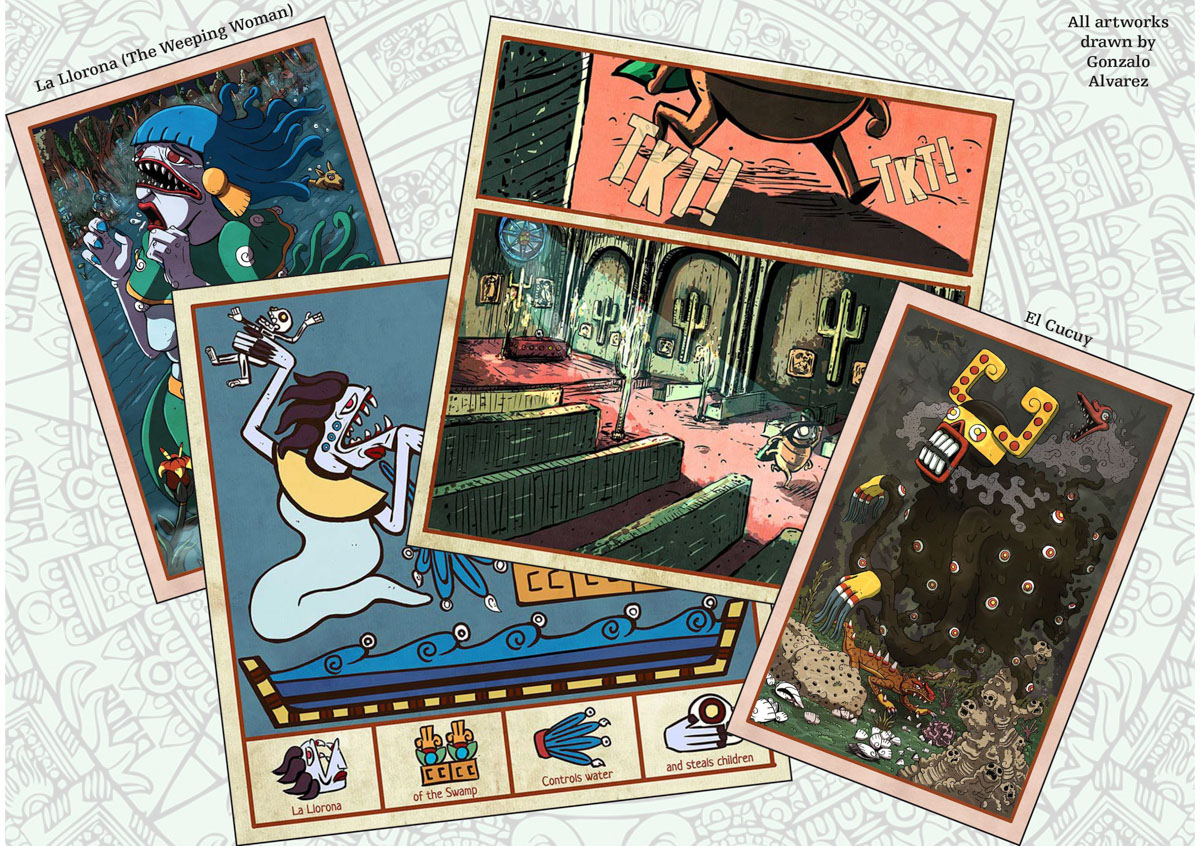Alvarez aims to bring mexican, mesoamerican cultures to the masses with his works
When Port Arthur native Gonzalo Alvarez started gaining national attention for his video game, “Borders,” which depicts the journey immigrants take from mexico to America, he was already working on his graphic novel, “The Legend of Polloman.”
Now, he’s in the process of getting the novel published. Both the video game and the graphic novel are part of Alvarez’s larger plan to bring mexican culture into an area of media which he says is too Eurocentric.
“I hope people can see worlds that are beyond the medieval Eurocentric spectrum,” Alvarez, who graduated from Lamar in 2017 with a bachelor’s degree in drawing, said. “For example, there’s a lot of people here in America who love Japanese culture and there’s people who even learn a bit of Japanese language. But no one really knows a lot about the Nawa culture, right? That’s the indigenous culture, the Aztecs.
“The culture of mexico is complex. The Spanish came in the 1500s and essentially Catholicized mexico. So what mexico is today is basically a hybrid — it’s these Native American rituals and culture mixed with Catholicism.
“My goal with the book is to awaken Latino people and teach them about their roots, because I didn’t know any of this stuff growing up and now I would say, I’m not necessarily an expert on it, but I know a lot because I’ve been doing so much research for the book.”
“Polloman” is set to be released in 2021 under HarperCollins. Alvarez said he wants people to learn about mesoamerican and mexican cultures without realizing that they’re learning.
“I’m framing it in a way, where, if you had no idea this was a real culture, it would still be interesting, just like ‘Lord of the Rings,’” he said. “Obviously, all of that is fictional, but you love learning about this land and Mordor, and all the different bad guys, elves and whatever.
“With my world, I’m doing the same thing, where you’re learning about these different characters, all of these different locations, but they’re all real. I want people to embrace the culture without even knowing it.”
Alvarez’s journey from high school student to having a book with a major publishing company didn’t come out of thin air. His dedication to having his voice heard and sharing his stories is something he’s always had.
“I liked drawing growing up but I never knew I could go into it professionally,” he said. “In high school, my teacher pushed me to apply for an AP class where I had to do a body of work. That was my first series. Then I went to college and I knew I liked drawing but I didn’t know what I wanted to do with it.
“While I was there, I just learned about so many things. Eventually, I realized I wanted to be a video game designer and graphic novel artist, even though I hadn’t read a single graphic novel growing up.”
Alvarez said he hadn’t had any formal education in art until he got to college. His parents, Gonzalo and Eva, immigrated to the United States almost 20 years ago — they were poor and didn’t have art education in their own households, but they were always supportive of their son’s aspirations, the younger Gonzalo said.
“I grew up with video games and a lot of cartoons,” he said. “I didn’t have anything that was fine art in my household. I didn’t really know what art was growing up. I just liked cartoons and comics.”
Alvarez’s artistic style is inspired by his years of watching cartoons and playing video games. In high school, he was introduced to comic books, and while in college, he became interested in printmaking which introduced bold black lines to his style.

“One of my teachers in high school started a comic book club and that’s how I got introduced to comics,” he said. “We all did a ‘zine.’ We did our first comic and I liked it. I was like, this is basically drawing but a lot, and I can make stories without having to animate them, which would take a lot longer to do. We had this idea for a video game-themed comic, and from there, I thought, ‘What if there was a fantasy video game but set in mexico?’ That’s where the idea for my current graphic novel sparked, and I’ve been working on it since 2014-15.”
In 2016, Alvarez had the urge to express his emotions over what he calls increasingly xenophobic and racist language from a then-presidential candidate, Donald Trump. He said after hearing the same rhetoric repeated by people he knew, as the child of immigrants, he felt personally impacted.
“I thought, ‘What if I made a video game where I put people in the shoes of what my parents went through crossing the border?’” he said. “Maybe that experience will have them at least think about it from a different perspective.”
While he knew how to draw, Alvarez said he knew nothing about video game programming. He journeyed to New York to attend IndieCade East 2016, an independent game festival. There, he met game developers Genaro Reyes and Jon DiGiacomo. Together, “Borders” was born.
“We became friends, and when I returned back home to Texas, I said, ‘Hey guys, let’s do a game jam,’ which is where you essentially give yourself a time limit — we decided seven days — to develop a game,” Alvarez said. “I had already had this idea of the immigration game design in my sketchbook. The idea was, you’d have to move from Point A to Point B, and there would be border patrol agents moving around that you have to avoid — kind of like a sneaking game.
“We sat down for seven days and we worked our butts off. We completed it and uploaded it to this website called itch.io, it’s basically a place where you can upload your games and people can play them.”
The game was released on July 4, 2016, and is still available for users to download for free.
“It was a terrible time to release a game,” Alvarez said. “And it wasn’t until the following year that it gained all the press.”
When the game released, Alvarez promoted it on his Instagram, which is where The Huffington Post picked it up, followed a month later by The Washington Post. After gaining national attention, Alvarez created an art installation centered around the game which was showcased in the SOL gallery in LU’s art department in 2017.
“There was a lot of great response to the game from the Latinx community,” he said. “I’m not the only first generation mexican-American — a lot of friends grew up in a similar situation.”
However, not all of the reactions were positive, Alvarez said.
“Channel 12News did a piece on (the game) and the Facebook comments section was pretty racist and xenophobic,” he said. “There were comments like, ‘Let’s go find his parents and send them back to mexico,’ even though we’re citizens. It was kind of a mixed response, but the majority of it was good.”
Alvarez said he embraced the positive reactions he received from people.
“I’m helping the community and providing a voice for a lot of people who maybe aren’t in the position I am to make a game, and I got lucky enough to find people to help me make one,” he said.
As for the negative reactions, Alvarez said he didn’t respond to the Facebook comments.
“I saw it as a waste of time,” he said. “There were so many of them, and I’m not going to change anyone’s mind on Facebook.”
All of these experiences have only furthered Alvarez’s dedication to producing “The Legend of Polloman.”
“When I did the first version in high school, I created this chicken man character with this cockroach side-kick based on ‘La Cucaracha,’ a mexican folk tale song,” he said. “They’re basically going through this fantasy world fighting mexican boogeymen like ‘El Cucuy’ or ‘The Weeping Woman.’ These are stories that I heard growing up, but that I had never seen on screen.
“I was just kind of tired of seeing dragons and elves and orcs — they’re fun, but there’s just so many different worlds of that and I was like, ‘Why isn’t there a world set in mexico, it has such a rich culture?’ I made the first little comic in that comic book club and I really enjoyed the story, so I just kind of continued working on it and writing it and developing it. It’s taken four to five years to get where I’m at now, but it’s at the point where it will be published soon.”
First came the idea, then the production, then the publishing deal. Alvarez chose to do the prologue of the book for his undergraduate thesis. He then produced the first chapter and presented it at the 2017 Texas Latino Comic Con.
“After graduating from Lamar with my thesis, luckily my fiancé started an internship and was able to pay the bills,” he said. “I spent my first year out of college developing the first chapter of the book. It was a grueling time — I spent 10 hours a day trying to get it done by July for the Texas Latino Comic Con, this big fund for Texas Latino people like myself, and I wanted to have it ready for that event.”
Alvarez printed the completed portions of his book and sold them at the convention, where he met fantasy artist John Picacio who’s illustrated book covers for “Game of Thrones,” among other things.
“He’s a huge fantasy artist and he started the mexicanx Initiative, which sponsors 50 mexican artists from around the world to come to Worldcon76, a sci-fi convention,” Alvarez said. “It’s primarily a white demographic, an older demographic. He’s the first host ever to be mexican. He sponsored us. I flew out there, and I met a lot of amazing mexican artists, but importantly, I met a graphic novel artist that I was on a panel with and she suggested that I try to find publishers and an agent.
“Initially, I was thinking of self-publishing the novel, but it really wasn’t going to be realistic. I wanted it to reach, especially, kids, so I went home and looked at the list of agents she sent me. I found, out of over a hundred agencies, there were only two that had a Latino person. I felt that I needed a Latino agent who would understand the stories I’m trying to tell and understand the value of it.”
Alvarez followed Marietta B. Zacker on Twitter, but before he could send her anything, she direct messaged him to find out more about “Polloman.”
“She was like, ‘What is Polloman?’” Alvarez said. “She said, ‘It’s funny looking and it’s interesting — send me everything you have about it.’ I sent her my pitch and the first chapter so she could see a sample of it, and she fell in love with it.
“She gave me a call the next day and said, ‘I usually don’t do this so quickly, but I’d love to be your representative.’ That was back in September of 2018. She became my agent and she started pitching it to publishers.”
The first publisher interested in the book was Penguin Random House, then Scholastic, then HarperCollins. Scholastic dropped out, and a bidding war between Penguin Random House and HarperCollins ensued.
“HarperCollins had the best bid, and so they picked me up for two books — the first one and the sequel — because I have eight planned and they picked the first two.”
When the first book releases in 2021, Alvarez said it will be around 200-250 pages, and will be sold in stores such as Barnes & Noble, with the sequel planned for release in 2022. Alvarez’s aspirations extend beyond the books — he has a 10-year plan in mind.
“I’m also a game designer, so I actually have a game group that I make games with, and our goal is to make mesoamerican-themed games,” he said. “I’m tired of games like ‘World of Warcraft.’ I want to make the mexican and Native American versions of those things.
“The novels, I’ve had them planned from the beginning as an intellectual property. I’ve actually been in contact already with animation studios to produce an cartoon series, although it’s going to be put on hold until the first book releases. I’m excited for that.
“The book is planned as eight different graphic novels — it’s one giant art, but each individual focuses on specific elements and I have so much side content planned — toys, board games, just like the whole shebang. Just like Pokémon has everything, like TV, games, cartoons, whatever, I want to do the same thing. But now the kids who are going to be buying this stuff are going to be learning without knowing. In 10 years, I should hopefully be able to produce all eight books and then the side projects, so I’m going to be old by the time I’m done.”
Alvarez said he’s been supported through this journey by important people in life like his family, his fiancé Grace, close friends, and the mexican artists he’s met along the way.
The journey has been tough, he’s been working non-stop for a few years, with Grace having to carry the financial load.
“I was working 10-hour days, taking no weekends, just to meet deadlines,” he said. “There were a lot of people telling me to get a part-time job while I was working on it just to have some money. They told me I should get a job and work on the book on the side, but I just felt like it was going to be good. I just needed to finish it. I needed the time.”
Alvarez said, above all, he hopes the book and journey towards it will inspire other first-generation kids to do whatever they dream of doing.
“If a mexican-American, who’s the first to be born here, first to go to college, first to learn English, didn’t have parents who had money and wasn’t necessarily in a location that would foster these type of things — like, literally, I started from the most zero level and made it to this point — essentially, I feel like if I can do it, anyone can do it,” he said. “So I hope that they can see, if they have even a single advantage, even the fact that they have a book in their hands — because I didn’t really have books growing up — that’s already a head start.
“By the time they’re my age, if they work as hard as they can, they’ll be better than I am right now. So that’s what I hope they see, that literally anyone can do it.”
To support “The Legend of Polloman,” visit Alvarez’s website, gonzzink.com, and sign up for the mailing list to receive release alerts. To support Alvarez himself, visit his Patreon at patreon.com/gonzzink, to donate monthly and see exclusive content.


